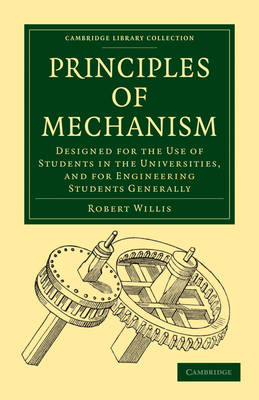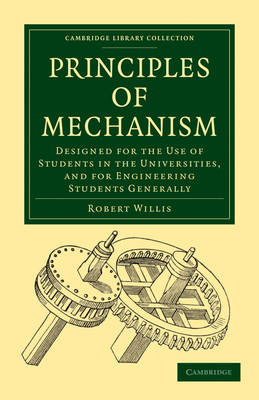
- Afhalen na 1 uur in een winkel met voorraad
- Gratis thuislevering in België vanaf € 30
- Ruim aanbod met 7 miljoen producten
- Afhalen na 1 uur in een winkel met voorraad
- Gratis thuislevering in België vanaf € 30
- Ruim aanbod met 7 miljoen producten
Zoeken
Principles of Mechanism
Designed for the Use of Students in the Universities, and for Engineering Students Generally
Robert Willis
€ 106,45
+ 212 punten
Omschrijving
Robert Willis (1800-1875) was a scientist, inventor and architectural historian of international repute. As Jacksonian Professor of Natural and Experimental Philosophy at Cambridge, he demonstrated specially made mechanical devices to huge audiences. First published in 1841, Principles of Mechanism provided the theory behind the demonstrations. He defined mechanism as the means by which any relations of motion could be realised. The book was extremely influential, with all books in English, French, and German on the subject for the next generation adopting Willis' classification and nomenclature. He worked closely with William Whewell, whose Mechanics of Engineering was published in the same year. These two books established the science of mechanism, and provided study materials for the rapidly growing engineering profession. The work became a standard textbook for engineering and mathematics students, with a second edition issued in 1870.
Specificaties
Betrokkenen
- Auteur(s):
- Uitgeverij:
Inhoud
- Aantal bladzijden:
- 484
- Taal:
- Engels
- Reeks:
Eigenschappen
- Productcode (EAN):
- 9781108023092
- Verschijningsdatum:
- 25/11/2010
- Uitvoering:
- Paperback
- Formaat:
- Trade paperback (VS)
- Afmetingen:
- 140 mm x 216 mm
- Gewicht:
- 607 g

Alleen bij Standaard Boekhandel
+ 212 punten op je klantenkaart van Standaard Boekhandel
Beoordelingen
We publiceren alleen reviews die voldoen aan de voorwaarden voor reviews. Bekijk onze voorwaarden voor reviews.







